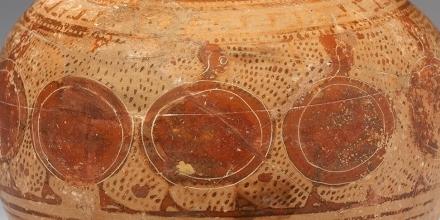
Classical Studies explores Ancient Greece and Rome through its literature, material culture, history, and society from the Bronze Age to Late Antiquity. It examines big questions which are just as relevant today as they were thousands of years ago. What is the best form of government: republic, democracy, or monarchy? What were the experiences of marginalised groups and how do we reconstruct their voices? How do we cope with grief and loss? Is there such a thing as a just war? How should we remember problematic individuals? What kinds of machines are most useful to humans? It is possible for one individual to change the world? The Ancient Greeks and Romans struggled with these and other fundamental questions about the human experience, as captured in their histories, poems, speeches, letters, arts and artefacts. Classical Studies at ANU places students at the heart of these conversations.
Our students join Thucydides and Aristophanes as they explore the devastating war between Athens and Sparta through Pericles’ soaring funeral oration and a wickedly hilarious female sex-strike, accompany Alexander the Great and Cleopatra at court and on campaign, and listen to Cicero and Seneca as they ponder the fall of the Roman Republic and the rise of the emperors. Yet our major is not merely the story of these prominent figures. Classical Studies students also uncover the world of Roman children – simultaneously joyful and precarious –through archaeology and inscriptions, discover the language of love and longing in the poetry of Sappho and Catullus, explore the many stories of innovation and creation, from Greek potters to the mathematics of Archimedes and the machines Hero of Alexandria, and trace the journeys of pilgrims and holy men and women to Rome and Jerusalem.
But Classical Studies is not a blind celebration of the past. The Greeks and Romans created beautiful monuments and works of art, from the Parthenon to the Dying Gaul, but they also endorsed enslavement and manipulated political rhetoric to justify colonialism and imperialism, a legacy which still haunts our contemporary world. The major devotes significant attention to the reception of Classical Studies in literature, film, art, and popular culture, in order to explore this complicated legacy and the ways in which Greece and Rome have been misappropriated by states, individuals, and pressure groups.
A major in Classical Studies complements study in Latin, Ancient Greek, English, Modern European Languages, History, Philosophy, Art and Design, Law, Politics and International Relations, Archaeology, Arab and Islamic Studies, Asian Studies, and numerous other areas.
Career Options
Classical Studies graduates have the ability to analyse, critique, and research history, literature, and culture. ANU Classics alumni have pursued successful national and international careers as: parliamentary advisors and researchers; senior officers at NGOs and think-tanks; strategists in the philanthropy sector; historians, curators, and conservators in libraries and museums; authors, editors, and translators in the publishing sector; teachers of Ancient and Modern History and Latin; university academics, administrators, and researchers in the fields of Classics, Music, Political Science, and Linguistics.